新职业英语_经贸英语教案_Unit3
新职业英语1Unit 3 教案
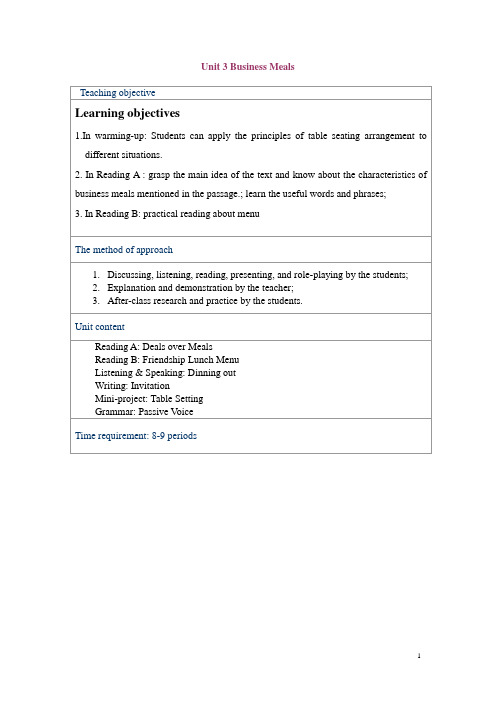
Unit 3 Business MealsUnit Focusentertain confidence imply urgency company multi-tasking pay knowledgeable style grace intelligent representative sought-after build up turn out see…through conduct oneself concentrate onTeaching proceduresThis unit is arranged for a time span of 8 hours, during which a time limit is suggested for each step. Though it’s always important to keep a time limit in mind for each activity, a teacher should never stick to a rigid time plan in teaching, but rather follow a more flexible time table when dealing with unexpected in-class occurrences and make necessary adjustments accordingly.Note that not every step suggested here is a must in teaching. A teacher can make whatever changes he thinks necessary.Hour 1:Course introduction 45 minutesWarming-up Task 15 minutes Objective: Ss can apply the principles of table seating arrangement to different situations.Suggested answers:A–Henry B–Susan C–Mary D–David E–GeorgeTable manners in the western countries1. How much do you know about the table manners?2. What are the differences between Chinese table manners and the Western table manners?Chopsticks are used to eat most kinds of Chinese foods.Hold your chopsticks towards their end, not in the middle or the front third when dining with them.When you are not using your chopsticks, or have finished eating, lay them down in front of you with the tips to left.Dinner knife butter spreader (奶油刮刀)刀Fork:salad fork, dinner fork, dessert fork 叉(餐叉分得很细)Goblet:water goblet, red wine goblet, white wine goblet 酒杯Spoon:soup spoon tea spoon 勺子Soup bowl 碗Service or dinner plate bread and butter plate 餐盘Napkin 餐巾1)As soon as the hostess picks up her napkin (餐巾), pick yours up and lay it on your lap.2)The Soup CourseDinner usually begins with soup. The largest spoon at your place is the soup spoon. It will be beside your plate at the right-hand side.3) The Fish CourseIf there is a fish course, it will probably follow the soup. There may be a special fork for the fish, or it may be similar to the meat fork. Often it is smaller.4) The Meat CourseThe main course is usually served by the host himself, especially if it is a fowl (鸡禽) or a roast which needs to be carved. He will often ask each guest what piece he prefers, and it is quite proper to state your preference as to lean or fat, dark (红肉) or light (白肉).5) Using Knife and ForkThe English keep the fork in the left hand, point curved downward, and bring the food to the mouth either by sticking the points onto it or in the case of soft vegetables, by placing it firmly on the fork in this position with the knife. Americans carve the meat in the same position, then lay down the knife and taking the fork in the right hand with the point turned up, push it under a small piece of food without the help of the knife and bring it to the mouth right-side-up.6) Helping Yourself and RefusingIf a servant passes food around, he will pass the dish at your left hand so that you can conveniently serve yourself with your right hand. Never serve yourself while the dish is on your right; it is then the turn of your neighbor on the right. It is polite to take some of everything that is passed to you. But if there is something you may not like, you may quietly say: "No, thank you."5) Using Knife and ForkThe English keep the fork in the left hand, point curved downward, and bring the food to the mouth either by sticking the points onto it or in the case of soft vegetables, by placing it firmly on the fork in this position with the knife. Americans carve themeat in the same position, then lay down the knife and taking the fork in the right hand with the point turned up, push it under a small piece of food without the help of the knife and bring it to the mouth right-side-up.6) Helping Yourself and RefusingIf a servant passes food around, he will pass the dish at your left hand so that you can conveniently serve yourself with your right hand. Never serve yourself while the dish is on your right; it is then the turn of your neighbor on the right. It is polite to take some of everything that is passed to you. But if there is something you may not like, you may quietly say: "No, thank you."9) Other Things on the TableWhen there are things on the middle of the table, such as bread, butter, jelly, pickles, nits, candies, you should not take any until the hostess has suggested that they be passed.10) Leaving the TableIt is impolite for a guest to leave the table during a meal, or before the hostess gives the signal at the end. When the hostess indicates that the dinner is over, she will start to rise from her seat and all the guests rise from theirs at the same time.New words in Reading A 15 minutes Objective: Ss can get familiar with the new words and expressions, etc..Steps:• Ss listen to the new words and expressions, etc.• Ss read the new words and expressions, etc.Notes: For a class with higher English proficiency, the teacher may follow the following steps:• Ss preview the new words and expressions.• Ss read the new words and expressions.• Ss dictate several important new words and expressions.Discussions before Reading A 15 minutes Objective: Ss can get familiar with the new words and expressions, etc..Steps:• Ss know something about Reading A.• Ss discuss the following two questions:1.What do you think are good table manners?2.What do you about deals over meals?• Comment briefly on their work.Hours 2-3:Reading A 45 minutes Language points 35 minutes Paragraph 1entertain: v. to invite people to your home for a meal or party or take your company’s customers to have a meal, drinks, etc.; to do something that amuses or interests peoplee.g. I’ll entertain my friends over the weekend.The child was entertaining himself with his toys.build up: to build; to increase, or become bigger or stronger graduallye.g. They have built up a good reputation.The noise built up until she couldn’t stand it any longer.formal: a. appropriate for official or serious situations or occasionse.g. I only wear this suit for formal dinners.Our boss is very formal; she doesn’t call anyone by their first name. Paragraph 2imply: v. to make something understood without expressing it directlye.g. I do not imply that you are wrong.urgency: n. something very important and needing to be dealt with immediatelye.g. Well, take it easy! It isn’t a matter of urgency.company: n. the state of being with someonee.g. Rita’s husband is away for the week, so I thinkI’d better go over and keep her company.Paragraph 3turn out: to have a particular result; to happen in a particular waye.g. That man we met turned out to be Maria’s second cousin.Don’t worry. I’m sure it will a ll turn out fine.pay: v. to bring a good result or advantage for someonee.g. It usually pays to tell the truth.be on one’s best behavior: to behave as well and politely as you can, especially in order to please someonee.g. I want you to be on your best behavior at Granddad’s.knowledgeable: a. (of a person) knowing a lote.g. Dick is very knowledgeable about wines.see someone through (something): to help someone continue doing something, especially something difficult or unpleasant, until it is finishede.g. This overcoat has seen me through many severe winters.He saw me through all the hard times.intelligent: a. having a high level of mental ability; good at understanding ideas and thinking quickly and clearlye.g. All teachers regard Jimmy as an intelligent student.intelligently: ad. in an intelligent waye.g. You have to speak intelligently at this important business meeting.Paragraph 4come in handy: to be usefule.g. I’ll put these bottles in the cupboard—they might come in handy someday. conduct: v. to behave in a particular way, especially in a situation where people judge you by the way you behave; to carry oute.g. Public figures have a duty to conduct themselves responsibly.The company conducted a survey to find out what their customers think about the new product.concentrate (on): v. to think very carefully about something that you are doinge.g. She was concentrating on her book and didn’t know what had happened. Paragraph 5sought-after: a. wanted by a lot of peoplee.g. Doctors are the most sought-after people in the area.Task 1, 2 10 minutes Task 1Objective:Ss can find some specific information in the passage.Steps:• Ss do Task 1.• Ask Ss to work individually.• Check the answers.Suggested Answers:Task 2Objective:Ss can find some specific information in the passage.Steps:•Ss do Task 2.• Ask Ss to work individually.• Check the answers.Suggested Answers:Language lab 45 minutes Task 1 5 minutes Objective:Ss know the spelling and meaning of the words and expressions from Reading A.Steps:• Ss read Task 1.• Allow Ss 5 minutes to do the task.• Check the answers.KeyKey: 1. E 2. D 3. A 4. H 5. I 6. B 7. J 8. C 9. G 10. F Task 2 10 minutes Objective:Ss can use the words and expressions from Reading A.Steps:• Ss do Task 2.• Ask Ss to work individually.• Check the answers.Answers1. entertaining2. manners3. implied4. urgency5. intelligently6. formal7. conduct8. knowledgeable9. turned out 10. representativeTask 3 10 minutes Objective:Ss can use the words and expressions from Reading A.Steps:• Ss do Task 3.• Ask Ss to work individually.• Check the answers.Key:1. He has built up a good reputation for his business.2. My little brother was on his best behavior in the summer camp.3. If you have a difficult time, I’ll see you through.4. Don’t throw the plastic bags away, as they may come in handy.5. It pays to know what you don’t know.Task 4 10 minutes Objective: Ss can express ideas in writing using the two models outlined for Task 4. Steps:• Read the models to Ss with an explanation if needed.• Ss work in pairs.• Check the answers.Key:Model 11. He did not know where to go.2. We have not decided whether to go there or not.3. I can tell you how to get to the cinema.Model 21. Where is the book which/that I bought this morning?2. The teacher who teaches you Spanish will come tomorrow.3. The woman who is speaking at the meeting is our manager.Task 5 10 minutes Objective:Ss can use the vocabulary in Reading A for translation.Steps:• Ss work individually or in pairs and translate the sentences.• Ask two Ss to write their translations on the board.• Comment briefly on their work with emphasis on the structures of their sentences. Key:1. It pays a lot to be careful in work.2. I have just enough money to see me through a year in the US.3. It turned out that he had never worked in that company.4. It is bad manners to stare at people.5. It’s too noisy outside for me to concentrate on my work.6. The Board of Directors selected him to be the General Manager of the company.7. Roast Chicken is my favorite dish in this Thai restaurant.8. We had ice cream for dessert after the main course.Hours 4-5:Listening 45 minutes Task 1 5 minutes Objective:Ss can understand the conversation and choose the best answer. Script:M: Excuse me, you must be Ms. Green from Australia?W: Yes, I’m Lisa Green from Australia.M: How do you do, Ms. Green. I’m Peter Smith, secretary to the Sales Manager of the GM Electronics.W: How do you do, Mr. Smith. I’m very glad to meet you.M: Glad to meet you too, Ms. Green. The waiting room is over there. Let’s take a short rest there and then we can go to the hotel.W: Thanks very much for your arrangement.Q1: Where is Ms. Green from?Q2: What is Peter’s job?Q3: What will the two speakers probably do next?Key: 1. D 2. C 3. BTask 2 10 minutes Objective:Ss can find specific information from listening to a passage related to the theme.Script & Key:M: Hi Diana, thanks for your help on the contract. We’re having a dinner this evening to celebrate getting the contract. We’d love you to come.W: I’d love to, but I’m afraid I have to work overtime tonight.M: That’s a pity! Maybe you could join us a little later?W: I’m really sorry. I just can’t make it this time. I’m going on a business trip tomorrow and have got an early plane to catch.M: Sorry you can’t be there. Maybe some other time?W: Sure. Anyway, thanks for asking. Hope you guys have fun!Task 3 10 minutes Objective: Ss can accurately write down the missing information.Script:M: Good morning, Season Hotel. May I help you?W: Good morning. I’d like to book two single rooms.M: OK. May I have the names, please?W: Sure. Please reserve the rooms under the names of Angel Smith and Mark Johnson. M: Angel Smith and Mark Johnson… No problem. When will they be arriving?W: This Friday, and they will stay for five nights.M: This Friday will be July 25th and they are leaving on July 30th. Right?W: Exactly.M: Any requirements for the rooms, Miss?W: Yes. I’d prefer them with a view of the sea.M: OK. I see. The room numbers are 1606 and 1608.W: Thank you very much for your help. Bye.Key:Task 4 10 minutes Objective: Ss can decide whether the statements are true or false.Script:M: Here we are at the Hongfu Restaurant. What would you like to eat, Ella?W: Of course I’d like to have some Chinese food. But I know very little about it. Could you recommend some?M: Sure. This restaurant is famous for its Kungpao Chicken, Sweet-and-Sour Fish, Mapo Tofu and Tomato and Egg Soup.W: Wow, what a variety! Let’s try the chicken and the fish, shall we?M: That sounds great. How about a Kungpao Chicken, a Sweet-and-Sour Fish, a Tomato and Egg Soup, and two bottles of Tsingtao beer?W: My mouth is already watering.M: You know we usually serve the food first and then the soup. But if you like, we can ask for the soup first.W: Oh, that is very kind of you. Thank you.KeyKey: 1. F knows little about 2. T3. F two bottles of Tsingtao beer4. F beforeTask 5 10 minutes Objective:Ss can find specific information from listening to a passage related to the theme.Script & Key:The main difference between Chinese and Western eating habits is that in the West everyone has their own plate of food, while in China the dishes are placed on the table and everyone shares. If you are being treated by a Chinese host, he will do the best to give you a taste of many different types of dishes. The Chinese are very proud of their food culture, and will do their best to show their hospitality.The meal usually begins with a set of at least four cold dishes, to be followed by the main courses of hot meat and vegetable dishes. Soup then will be served followed by staple food ranging from rice, noodles to dumplings.Perhaps one of the things that surprise a Western visitor most is that some Chinese hosts like to put food onto the plates of their guests. This is a sign of friendship andpoliteness. It is always polite to eat the food. But if you do not like it, just leave the food on the plate.Speaking 45 minutes Task 6 45 minutes Objective:Ss are able to ask and give advice with the useful expressions.Steps:• Ss read Task 6.• Ss work in pairs to ask and give advice.• Ss complete the chart.Key: (Omitted)Extensive Reading1. Ask the students to discuss in pairs something about west meals manners2. Read the passage. Then match the business meals with their characteristics.3. Lead the students to read the text together part by part and ask them to answer some simple questions to check whether they have understood the passage or not.Para1Westerners do an extraordinary amount of business over meals, from a quick breakfast to “working lunches” to cocktail receptions and formal dinn ers.amount of不可以修饰可数名词。
新职业英语1--Unit3
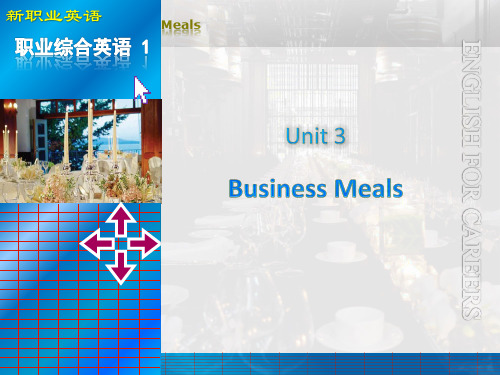
multi 是一个前缀,表示“多个,多种或多项的”。
e.g. multilateral 多边的,多国参加的 multilingual 使用多种语言的
multinational 多国的,跨国的
Unit 3 Business Meals
8) nightmare n.
1恶梦
2可怕的事情,恐怖的经历
e.g. have a nightmare 做恶梦 Traveling on those bad mountain roads is a nightmare. 9) pay v. 付(款),支付;付清;有利,值得 (1) It pays sb. to do sth. 做sth对sb来说是很值得的 It pays me to keep that stock. (2) pay (sb.) money for sth. 付钱(给某人)买…
< Back
Next >
Home
Unit 3 Business Meals
Warming-up Warm-1
Task 1 Complete the following table seating arrangement. Principles of Seating Henry is retiring on Arrangement Monday. Mr. Nelson, Chairman of your company, 1.Seat people who have asks you to arrange the table common interests together. seats for Henry’s farewell 2.Pair male and female guests. dinner. Here are some 3.Seat guests of honor in principles for arranging seats order. The most important at a dinner table and the person should be seated at information about the the right hand of the host. guests.
新职业英语1 Unit 3 Business meals
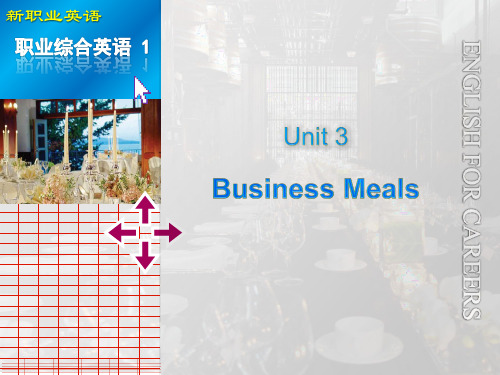
Unit 3 Business Meals
ReadTexitng A A-1
Deals over Meals
As a form of business entertaining, business meals are increasingly used to build up personal trust and confidence. / Westerners do an extraordinary amount of business over meals, from a quick breakfast to “working lunches” to cocktail receptions and formal dinners.
< Back
Unit 3 Business Meals
Reading A A-Trans-2
早餐会晤很少超过一个小时,带有一定的 “紧迫”意味,在商务旅行中很方便安排。/要 加深对客人的了解,午餐则是最好的形式。当 然,午餐中并不是非谈生意不可。/花上45分钟 或者一小时喝喝下午茶或咖啡,可以轻轻松松 地谈生意。/晚餐则比较正式,通常不宜谈生意, 这是个彼此了解并享受相互之间交往的时刻。
< Back
Unit 3 Business Meals
Reading A A-Trans-4
掌握良好的进餐礼仪非常管用,它能让你充 满信心,相信自己可以做到举止得当。毕竟,你 是要跟客人交流,而不是专注于用哪只餐叉。/正 确选择你面前的一堆银餐具并不像一开始看起来 那么困难。一定要先取用离你餐盘最远的刀叉和 汤匙,然后逐渐地向内取用。要记住一条简单的 规则:液体放在右边,固体放在左边。
representation n.表征
新职业英语通用版第二册Unit 3PPT幻灯片课件

Unit 3 Business Travel
ReadTexitng A A-3
If you can secure the evening of a local in your destination town, you can get quite an amazing tour of the area and see things that tourists may never find. It isn’t that hard to invite a local to be your guide. If you have expense account money, you can arrange to buy your guide dinner. They get a good meal for free, and you get a guided tour of the area. But don’t be afraid to be a tourist if you are in a great city and you want to see the big sites. It can be a fine memory of your visit to the town, and after all, you’ve worked hard on your business objectives so you are entitled to some relaxation.
< Back Next > Home
Unit 3 Business Travel
ReaTdext iA-n2 g A
Business trips don’t have to be all about business. There are times when you have completed your work and you can take in some of the local color, attractions and good food. The first resource to find out what is really cool to enjoy in the city or town you are visiting is the locals. If you go to a faraway town to conduct business with a partner or vendor, they are often more than happy to show you the lay of the land and what is fun to see and do in town.
新职业英语通用版第二册Unit 3
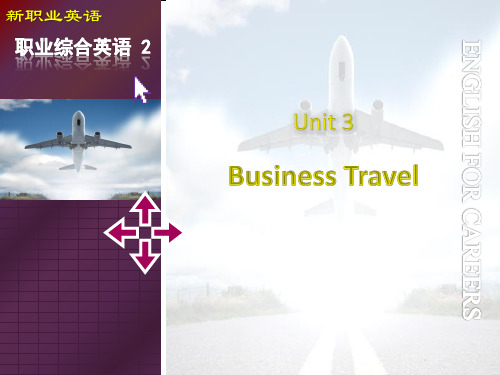
are times when you have completed your work and you can
take in some of the local color, attractions and good food. The first resource to find out what is really cool to enjoy in the city or town you are visiting is the locals. If you go to a faraway town to conduct business with a partner or vendor, they are often more than happy to show you the lay of the land and what is fun to see and do in town.
< Back
Next >
Home
Unit 3 Business Travel
Text Reading A A-3
If you can secure the evening of a local in your destination town, you can get quite an amazing tour of the area and see things that tourists may never find. It isn’t that hard to invite a local to be your guide. If you have expense account money, you can arrange to buy your guide dinner. They get a good meal for free, and you get a guided tour of the area. But don’t be afraid to be a tourist if you are in a great city and you want to see the big sites. It can be a fine memory of your visit to the town, and after all, you’ve worked hard on your business objectives so you are entitled to some relaxation.
新职业英语基础篇 Unit1-8(教案全)
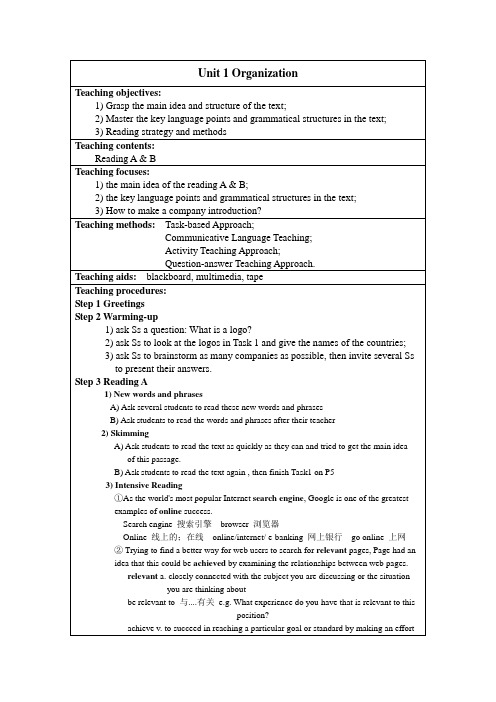
instanta. happening immediately; (of food) that can be made quickly and easily
e.g. 1. She took an instant dislike to me.
excelv. to be very good at doing something excel (in/at)
e.g. 1. The school excels in sports.
2. She has always excelled at foreign languages.
Today, Google owns YouTube, Blogger and other hot websites and has become the leaderin terms ofad-basedrevenueon the web.The brain child of two studentshas become a billion-dollar company and one of the best-knowntrademarks in the world. Google’s historyserves asa perfect model andinspirationfor Internetentrepreneurstoday.
3)How to make a company introduction?
Teaching methods:Task-based Approach;
Communicative Language Teaching;
Unit 3新职业英语第一册

教案Unit 3 Business Meals —1: Reading AI. Revision and Leading-inA. RevisionThe teacher checks the students ’ assignments to have a review of the contents learned in the previous period.B. Leading-in: Free Talk on Business MealsThe students are expected to share their information and ideas about business meals. Warming-up: Principles of table seating arrangement① Seat people who have common interest together.② Pair male and female guests.③ Seat guests of honor in order. The most important person should be seated at the right hand of the host.Free Talk on Table MannersNow I am honored to be invited to a formal business deal, can you give me any valuable suggestion on how to behave myself or what we call Table Manners?II. The Presentation of The New MaterialA. Pre-reading Tasks —New Words Study1. entertain: to invite people to your home for a meal or party or take your company’s customers to have a meal, drinks, etc; to do something that amuses or interests people e.g. I ’ll entertain my friend over the weekend.The child was entertaining himself with his toys.2. confidence: firm trust (in someone ’s ability, or in what is said, reported, etc.) e.g. He answered the questions with confidence.=He answered the questions confidently. Don ’t put too much confidence in what the papers say.There is a lack of confidence in the Government, i.e. People do not believe that its polices are wise.c.f. I’m telling you this in (strict) confidence —so don ’t breathe a word of it. (Question: Can you tell me the meaning of confidence in this sentence? Try to translate it into Chinese.)3. imply:to make something understood without expressing directlye.g. I do not imply that you are wrong.What can you imply according to this passage?4. urgency: something very important and needing to be dealt with immediately e.g. Well, take it easy! It isn ’t a matter of urgency.I detected a note of urgency from her voice.c.f. urgent—urgently—urgencye.g. It is most urgent that we operate on this patient.My car is in urgent need of repair.pany: the state of being with someonee.g. Rita’s husband is away for the week, so I think I’d better go over and keep her company.6.multi-tasking:multi-: having many ofe.g. multi-colored: having many of colorsa multi-store car park, i.e. consisting of a building with several floors(Question: Can you make out the meaning of multi-tasking according to your understanding?)7.nightmare: frightening dreame.g. I have nightmares about falling off a cliff.It was really a nightmare to work in such a company.(Question: Have you ever had a nightmare? What was it like?)8.pay: to bring a good result or advantage for someonee.g. It usually pays to tell the truth.9.knowledgeable:(of a person) knowing a lote.g. Dick is knowledgeable about wines.10.style: superior or fashionable quality of someone or sth; distinctivenesse.g. She performs the songs with style and flair. 她演唱歌曲既有风度又有才华。
经贸英语说课稿Unit3SocialCustom

经贸英语说课稿Unit3SocialCustom经贸英语说课稿 Unit 3 Social Custom在教学工作者实际的教学活动中,可能需要进行说课稿编写工作,认真拟定说课稿,那么大家知道正规的说课稿是怎么写的吗?下面是小编整理的经贸英语说课稿 Unit 3 Social Custom,欢迎大家分享。
一、说教学设想教育就是培养习惯—————叶圣陶二、说学情教学对象是经贸英语专业学生,班级女生居多,她们对英语学习有积极性,但是英语基础参差不齐,有些同学还比较羞怯,不敢主动参与口头的表达。
作为全国闻名的“侨乡”,泉州地区有很多的外贸企业,学生就读经贸专业本身就有将来从事涉外工作的意愿。
因此基础英语课应该与专业挂钩,体现“基础文化课为专业课服务”的理念。
针对上述情况,在课堂教学内容上,我会多提供一些与专业相关又能够实际运用的知识;在教学方法上,尽量灵活多样,充分调动学生的积极性,让学生能够参与到教学活动中来;针对班级人数不多的特点,刚好可以给予每个学生更多的机会进行口头练习和实际操练,使人人的交际能力都可以得到提高。
三、说教材1、教材内容及处理方法第一册的第三单元(Social Customs:A Dinner Party)第一节课,本单元以西方国家的“宴会、聚会”为话题开展教学活动。
主要是让学生了解掌握一些西方的社会文化和餐桌礼仪(Social Customs & Table manners),以及结合话题情境进行实际运用。
对于将来可能从事涉外工作的经贸英语专业的学生来说,本课的背景话题及能力目标都是比较具有实际意义的。
本节课是本单元的第一课,在忠实于教材的前提下,结合学生实际和专业特点,我将向学生介绍一些关于西方的社会文化和餐桌礼仪知识,并创设出一些实际情境,通过引导和鼓励学生运用本课所学重点句型、词汇,让她们进行模拟交际练习,使她们能够将所学知识转化为实际能力。
2、教学目标:(知识目标、能力目标、德育目标)知识目标:(1)了解西方的有关宴会、聚会上的一些习俗和禁忌(2)学习、掌握如何就一些西方文化、交际为背景征求意见和提出建议的句型。
新职业英语第二版Unit 3ppt课件
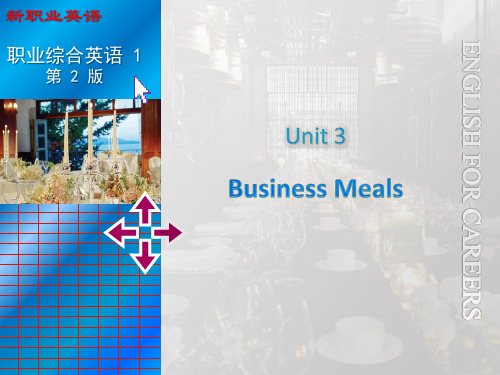
Unit 3 Business Meals
WarmWianrmg--2up
5) Using Knife and Fork The English kee, point curved downward, and bring the food to the mouth either by sticking the points onto it or in the case of soft vegetables, by placing it firmly on the fork in this position with the knife. Americans carve the meat in the same position, then lay down the knife and taking the fork in the right hand with the point turned up, push it under a small piece of food without the help of the knife and bring it to the mouth right-side-up.
2.Pair male and female guests.
dinner. Here are some
3.Seat guests of honor in
principles for arranging seats at a dinner table and the
order. The most important person should be seated at
Fruits
Apricot Strawberry Pineapple Peach
- 1、下载文档前请自行甄别文档内容的完整性,平台不提供额外的编辑、内容补充、找答案等附加服务。
- 2、"仅部分预览"的文档,不可在线预览部分如存在完整性等问题,可反馈申请退款(可完整预览的文档不适用该条件!)。
- 3、如文档侵犯您的权益,请联系客服反馈,我们会尽快为您处理(人工客服工作时间:9:00-18:30)。
Unit 3Business Negotiation本单元结合国际经贸业务中的典型工作流程、工作场景概述国际货物买卖过程中商业背景调查之后的一个重要环节——“交易磋商”:交易磋商概述:介绍交易磋商过程中典型的四个环节,主要涉及四个环节的基本含义、内容和在整个过程中的地位与作用(Reading A),为进行实际交易磋商提供理论指导;口头磋商:根据业务需要,向贸易伙伴询问商品报价、提供报价、磋商分歧和达成协议(Listening & Speaking),学习实际磋商中的谈判技巧;书面报盘与还盘:客户通过电子邮件向公司相关人员进行报盘,即商品的名称、价格和样品等信息,公司对报盘进行还盘,指出需要进一步磋商部分,并提供具体建议(Reading A)起草询盘和介绍信件:根据所给的信息,起草一份得体的询盘和接受信函(Reading B & Writing), 熟悉交易磋商信函包括的一般内容和格式。
Unit ObjectivesAfter studying this unit, you are able to:Understand the four basic steps in the process of a business negotiationKnow the formats of enquiry, offer, counter-offer and acceptanceUse the bargaining skills in business negotiationDraft and answer enquiry, offer, counter-offer and acceptance1.Warming-upTask 1The following jeans picture is a sample for whole sales advertised in China Daily. Discuss with your partner what you will enquire of the seller when you plan to import them.A price listSpecificationQuantitySamplesTerms of paymentShipmentTask 2Discuss with your classmates to find out what steps might be taken to reach a deal onimporting the jeans above. Then, fill in the following boxes and explain why.2. Reading ABackground InformationAsa keypart in international trade, business negotiation refers to the process in which a seller and a buyer negotiate the terms and conditions on trading specified products, and finally reach an agreement. It can be done orally or in writing. Normally, it comes when the company finishes its business background check on its potential business partner. The generalprocedure of business negotiation is enquiry, offer, counter-offer, and acceptance. But it should be noted that in practice not all business negotiations go through the four phases.Task 1Before reading the passage, see how much you know about the business negotiation by answering the following questions.1. Have you ever heard of the general steps in business negotiations If so, list them in time order; if not, guess what they are.Suggested AnswersI’ve heard a little bit about the steps of business negotiations in Ch inese. And after discussing with Tom, we finally nail down our version of the general steps in business negotiations. The first step is to ask general information about a product. I remember it is called “enquiry”; next is to give a reply to the so -called “enquiry”, which is mainly on the product’s price; the third step is called “counter -offer”; and the last one is to reach an agreement which means one party finally accepts the other’s conditions and terms.2. What do we need to pay close attention to in business negotiationsSuggested AnswersWe think all the four steps are very important. For example, if you are a buyer and want to make an enquiry about the product you are interested in, you should state clearly the name and specifications of the product in the letter. And if you want to buy a lot, you’d better tell the seller to quote you the best price. For the seller, he should reply the enquiry as soon as possible. When quoting the price, he is strongly recommended to make it clear that the price might fluctuate, especially in a turbulent market. When receiving the seller’s offer or quotation, you might find it impossible toaccept. Don’t reject it rudely or give no reply because he might be your future business partner. When drafting a counter-offer, you should give good reasons for the part you disagree with and your new suggestions. As to the last step, “acceptance”, you’d better restate what you have agreed on to make sure there is no misunderstanding about it. It is much helpful, especially after several rounds of exchanges between you and the seller.TextGeneral Steps in Business NegotiationsGenerally speaking, business negotiations involve four steps: enquiry, offer, counter-offer and acceptance.一般来说,交易磋商包括四个步骤:询盘、报盘、还盘和接受。
The first step is “enquiry”. When reading an advertisement in a newspaper, website or anywhere else, buyers may make requests for the information relating to their interested products like price lists, samples and terms of payment. Such a request is called “an enquiry”.第一步是“询盘”。
买方在报纸、网站或者其他地方看到一则广告后,可能会向对方索取有关自己感兴趣的商品信息,如价格表、样品、付款条件等。
而这种索取信息的请求就被称为“询盘”。
After sending the enquiry, it comes to “offer”. An offer is the expression of the wish of the seller to sell particular goods under stated terms, including quantity, prices, shipment, terms of payment, etc. It usually follows an enquiry that is either written or oral.在发出询盘后,买方就会收到“报盘”。
